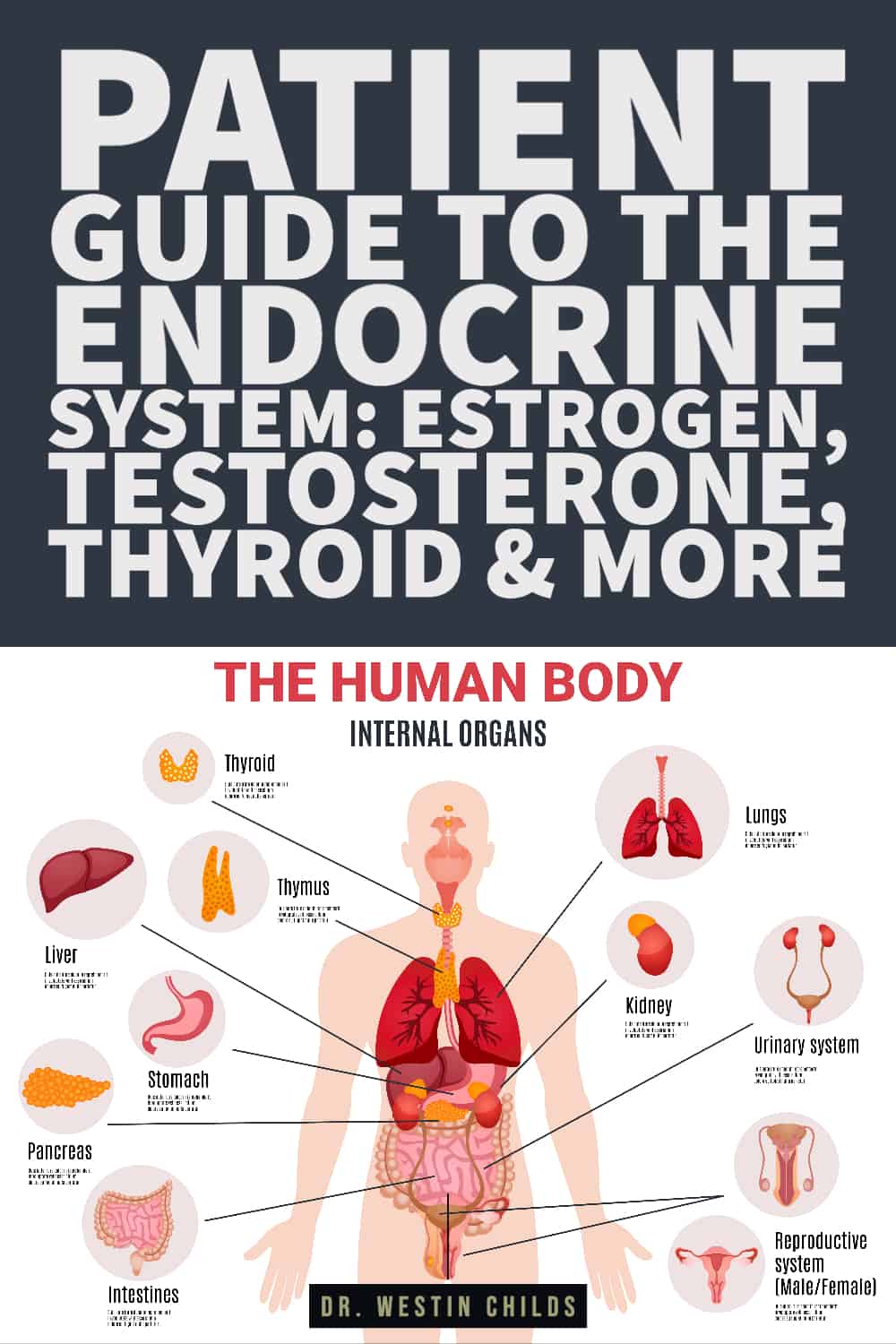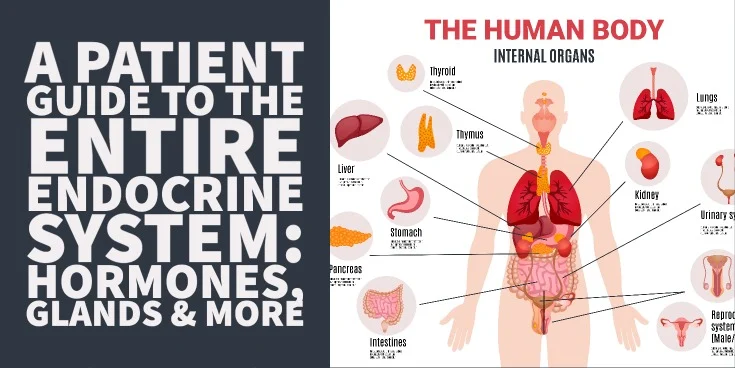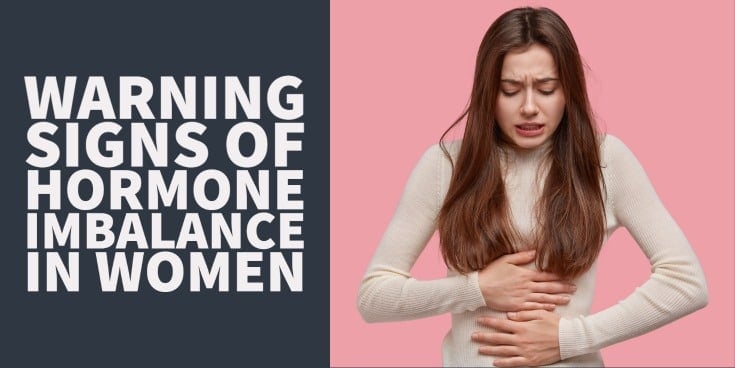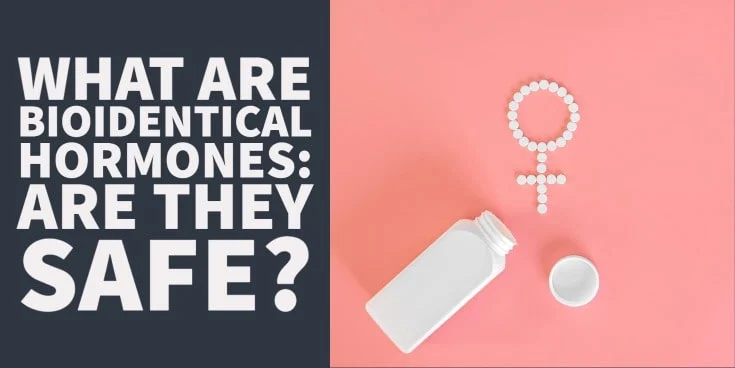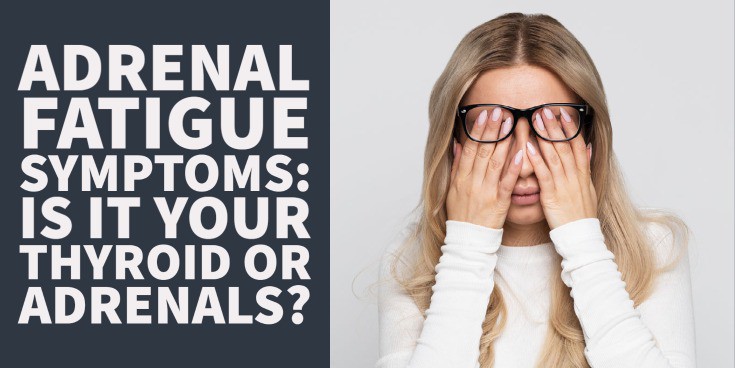The endocrine system is probably one of the most important systems in your entire body.
Why?
Because it produces the hormones that make you, you.
Small changes to these hormones can result in big symptoms in your quality of life.
Fatigue, weight gain, mood changes, and libido changes are just some of the consequences of hormone imbalance in this system.
This guide will teach you everything you need to know (from the perspective of a patient) about your endocrine system and how to determine if you are suffering from hormone-related issues.
What is the Endocrine System?
The endocrine system produces hormones (1) that regulate your sex drive, and your weight through your thyroid, it helps you sleep through the secretion of melatonin, it helps to provide you with energy through adrenal gland function, and much much more.
These hormones work together in a complex way to help regulate each other and help you feel healthy.
But what happens if you have issues with any one of these organ systems?
You may experience serious symptoms ranging from quality of life disturbances (fatigue, weight gain, depression) to life-threatening conditions.
For the purpose of this article, we are primarily going to focus on those issues which affect your quality of life.
So if you are experiencing issues such as fatigue, weight gain, depression, chronic pain, low sex drive, inability to build muscle mass, bloating, anxiety, menstrual problems, infertility, and so on, then this is the post for you.
All of these problems may be attributed to slight disturbances in hormone levels in your body.
The more serious issues are rarely ever missed by Doctors, but these chronic quality-of-life issues may be more difficult to diagnose and manage and may be missed by your Doctor.
Conventional Approach to Hormone Management
Doctors are great at many things, but hormone management is not one of those things.
Doctors are trained to think about hormone balance in your body in a very black-and-white way.
From their perspective, either there is some massive problem such as a huge overdose of hormones in your body, or there is so little hormone floating around that it is basically non-existent.
In this way, they rule out the possibility that hormone balance lives on a gradient or on a spectrum.
On a spectrum, disease or imbalance can exist to varying degrees until it gets worse and worse and reaches some critical point.
You can think of this as your hormones functioning as a percentage of a whole.
For instance:
In the optimal setting, your body produces 100% testosterone which helps to control your mood, lean muscle mass, libido, and so on.
As you age, or as other factors influence your body, this percentage may drop to 80% of normal and so on.
As this percentage drops you may begin to experience systems that lead you to your doctor’s office (symptoms such as these in the case of low testosterone).
So what’s the big problem?
These symptoms will largely be ignored unless your testosterone drops to less than 10% of whatever the reference range of the lab is.
This leaves you feeling poorly for a long period of time as this percentage of hormone function drops over time.
What’s interesting is that Doctors are aware of this spectrum of disease as it exists in many other areas of medicine, but they fail to understand it in the context of hormone balance.
Take for instance high blood pressure (2) or chronic kidney disease (3).
Both of these conditions exist on a spectrum with varying degrees of severity.
But these diseases are NOT ignored in their early stages, in fact, they are often treated aggressively.
Why doctors don’t apply this logic towards hormones is a story for another day, but for now just realize that it exists.
The good news is that there are therapies and treatments that you can undergo to potentially help improve your endocrine system if you are feeling poorly.
Key Organs in the Endocrine System
In this section, I’m going to walk you through some of the most important organs in your body (the ones that secrete and control your hormones).
I will focus on the major functions of these organs and what you may experience if there is a problem with your body.
As we’ve already discussed, the hormone systems in your body tend to be largely ignored by conventional physicians unless there is a massive problem but what they fail to recognize is that there can be a sub-optimal performance in many of these systems.
Even though we are going to discuss these organs individually it’s important not to lose sight of the fact that the body functions as a unit with all of the parts working and moving together.
So when there is a problem in one system there is almost always some other downstream consequence as a result of the initial issue (4).
This can cause a chain reaction which can often be treated by looking for the “root cause”.
Keep this in mind as we discuss each system!
Also, this is not a complete guide to all of these organ systems.
We could write an entire book on each topic (indeed, books already exist on these topics!), but we can hit the highlights and those issues that most commonly affect people.
Whenever relevant, I will also touch on some of the more controversial and integrative/alternative diagnoses associated with each gland…
#1. Adrenal Gland
Your adrenals sit on top of your kidneys in your abdomen and are probably best known for their ability to produce cortisol and adrenaline.
Cortisol is often cited as the energy and stress hormone which is secreted in high amounts when your body is under stress.
Adrenaline is another hormone that is secreted during times of “fight or flight” from a portion of your adrenal glands.
Adrenaline helps increase blood pressure, regulate your metabolism, and so on.
Together you can think of your adrenal gland as a gland designed to help you tolerate and manage stress.
Stress is something that we all deal with on a daily basis and we all know that a healthy level of stress is a good thing, but what happens when stress becomes too much?
This is the idea behind the diagnosis of “adrenal fatigue”.
Those with adrenal fatigue often experience the following:
- Constant and chronic daily fatigue
- Sensation of feeling wired but tired
- Reliance on caffeine for energy
- Cravings for sugary and salty foods
- Afternoon crash around 2-3 pm
- Inability to fall asleep despite feeling exhausted
- Reduced quality of sleep
One of the main problems with adrenal fatigue is that people who experience the symptoms associated with this condition often have normal cortisol levels.
So, while this remains a popular diagnosis among integrative circles, it’s not an accepted diagnosis among conventional physicians.
But should it be?
It certainly remains logical that constant and perpetual stress may lead to negative consequences in the body.
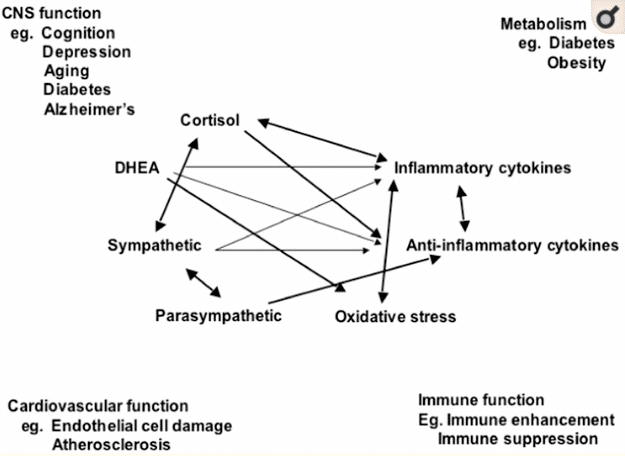
We know from many studies that excessive stress leads to sleep problems, hormone imbalance, and weight gain.
Perhaps the concept behind adrenal fatigue is better explained by changes that occur at the receptor level as opposed to absolute changes to hormone levels in the body (7).
The good news is that if you are experiencing these symptoms you may find relief with basic changes such as meditation (8), improved sleep, changes to your diet, the use of certain supplements, and other stress reduction techniques.
So, even if you don’t believe in the concept of adrenal fatigue you may still benefit from simple and healthy life changes!
#2. Thyroid Gland
Your thyroid gland sits at the base of your neck and produces thyroid hormone.
Thyroid hormone helps regulate MANY functions in the body (9), in fact, thyroid hormone imbalances may cause 30+ different symptoms depending on the individual.
Your thyroid is most known for its ability to help regulate your metabolism through the most powerful thyroid hormone T3 (triiodothyronine).
T3 is secreted directly from the thyroid gland but is also produced through the conversion process from T4 (thyroxine).
Thyroid-related problems may be one of the most common endocrine disorders (next to insulin resistance and diabetes) with up to 10% of the population suffering from some thyroid-related disease (10).
An excess of thyroid hormone (such as seen in hyperthyroidism) causes your entire body to “speed up”.
Those with hyperthyroidism experience symptoms such as diarrhea, rapid heart rate, weight loss, and hair loss.
Those with hypothyroidism experience the exact opposite as their entire body “slows down”.
Those with hypothyroidism may experience symptoms such as weight gain, depression, constipation, a slower-than-normal heart rate, a low body temperature, and dry skin.
Thyroid problems can be easily diagnosed and assessed with simple routine blood tests.
While diagnosis remains simple, management of thyroid disease remains somewhat controversial.
You can read more about these issues and what to do about them here.
#3. Ovaries
In women, ovaries directly produce the sex hormones estradiol and progesterone (11).
These sex hormones regulate the menstrual cycle, are involved in fertility and the ability to conceive, and your mood, help manage your weight, support sex drive and support the development of female sex characteristics such as your breasts and fat deposition during puberty.
Sex hormone imbalances, in both men and women, are becoming increasingly common.
Conditions such as obesity promote the production of excess estrogen through aromatization (12).
Other hormone imbalances such as thyroid disease can also indirectly lead to infertility and menstrual problems through their influence on progesterone (13).
Women who suffer from sex hormone imbalances often know something is “off” in their bodies because they no longer feel like “themselves”.
Symptoms such as weight gain (especially in the thighs and hips), changes to your menstrual cycle, bloating, cravings for foods, inability to control your mood, changes to your body temperature and so on may be early indicators that something is off with your hormones.
Both estrogen and progesterone can cause these issues but most commonly women will suffer from an excess of estrogen and a deficiency in progesterone.
This tends to occur primarily because excess fat accumulation in women will usually lead to excess estrogen production (and as a nation we suffer from obesity).
Unsurprisingly, perhaps, is that there is controversy surrounding how to treat hormone imbalances in women.
Many physicians are willing to prescribe high doses of synthetic birth control pills to “shut down” the normal hormone system, but balk at the use of bio-identical hormones that your body is used to making on its own.
This logic from conventional physicians has led to the widespread use of birth control pills for treatments such as endometriosis, PCOS, and PMS when lifestyle changes such as diet, exercise (14), and some supplements may potentially help.
You can test for both estradiol and progesterone in the blood (through routine blood tests) and you can learn more about how to determine if you have normal estrogen here and normal progesterone here.
#4. Testes
In men, the testes help produce one of the most powerful and important male sex hormones.
What hormone am I talking about? Testosterone.
Testosterone is present in both men and women, but in men, it helps to control libido (15) (sex drive), muscle mass (16), metabolism, weight (17), mood, metabolic function (18), and much more.
Testosterone is probably the single most important hormone in men when it comes to quality of life.
This is exactly why there is such a huge emphasis on male testosterone or “low T” clinics in the United States.

Under normal conditions, testosterone declines as men age up until they hit age 50 or so when they reach andropause.
Andropause is the male equivalent of menopause and both conditions result in several changes which both men and women are not too fond of.
But other conditions can result in the premature decline of testosterone levels in men in their 20s, 30s, and even 40s.
Conditions such as weight gain (even 10-20 pounds) can prematurely lower testosterone (19).
But that’s not all:
Insulin resistance from poor diet, lack of sleep, excess stress from work (20), and a sedentary life (lack of exercise) have all been shown to prematurely lower testosterone.
This has led many men to seek out testosterone replacement programs designed to normalize their testosterone.
While testosterone can be a safe and effective tool in both men and women (21), you should always do your best to take care of lifestyle factors (such as weight, sleeping habits, and so on) before using testosterone.
#5. Hypothalamus
This small gland is found in your brain where it sits next to the pituitary gland.
The hypothalamus serves to communicate almost directly with the pituitary gland to help regulate almost all of your hormones at a central level.
The hypothalamus also helps to regulate your appetite, metabolism, sexual desire, and emotional responses.
It does this by sampling your blood for certain metabolites and then relaying that information to the pituitary where it can stimulate the release of certain hormones.
You can think of the hypothalamus as one level higher than the pituitary gland.
Just realize that your hypothalamus is pumping out hormones designed to help increase testosterone, estrogen, progesterone, cortisol, and thyroid hormone.
Hypothalamic function can be altered and suppressed by factors such as an unhealthy diet, excessive exposure to stress, lack of sleep, and even lack of exercise.
Because of its importance in the regulation of MANY hormone systems, a poor lifestyle can cause a dramatic impact on your quality of life if it suppresses hypothalamic function.
#6. Pituitary
The pituitary is often referred to as the “master gland” because its main job is to produce prohormones which cause the release of pretty much all of the other hormones we’ve discussed so far.
This gland is in your brain and secretes a bunch of “stimulating” hormones which find and act on target tissues to stimulate the release of hormones.
Your pituitary gland is constantly sensing your blood for hormone levels and it responds by either increasing the amount of stimulating pro-hormone or by decreasing it.
In this way, it can help regulate all of the hormones we’ve discussed by acting as a “central computer” for your body.
Here is a list of some of the stimulating pro-hormones produced by the pituitary gland:
- FSH (Follicle-stimulating hormone) & LH (Luteinizing hormone) – FSH and LH stimulate the ovaries and testes to produce sex hormones such as testosterone, progesterone, and estradiol (22) and sperm production (in men). Both men and women have FSH and LH in their bodies which serve to help control sex hormones.
- ACTH (23) (Adrenocorticotrophic hormone) – Stimulates your adrenals to produce cortisol.
- TSH (Thyroid-stimulating hormone) – Stimulates the thyroid gland to produce thyroid hormones both T4 and T3.
- Prolactin – Stimulates the breasts to produce milk.
- GH (Growth hormone) – Growth hormone helps to both grow and repair tissues in your body. Growth hormone during puberty helps the body grow and GH is hypothesized to play an important role in the aging process in adults (24).
Suppression of these hormones can be caused by trauma (seen in many people who have previously served in the military overseas (25)), infections, tumors, certain medications, extreme dieting, and so on (26).
Any problem with your pituitary gland will often result in large changes to MANY hormones in your body.
These pro-hormones can be easily assessed through routine blood work.
#7. Pineal Gland
The pineal gland is a small pinecone-shaped gland found near the center of your brain.
It’s most well known for its secretion of melatonin (27) which is a hormone designed to help regulate your sleeping patterns and your circadian cycle.
Chronic stress, exposure to blue light from computer screens, disturbances in other hormones, and travel can cause dysregulation in the secretion of melatonin.
Small disturbances may manifest as difficulty falling asleep, staying asleep, and waking up feeling restful.
Melatonin is available over the counter and can be used as a supplement for very specific conditions to help with sleep, but it should generally only be used temporarily.
It’s important to remember that, even though melatonin is available over the counter, it is still a hormone.
#8. Parathyroid Gland
Your parathyroid glands are found behind your thyroid and they help to regulate both calcium and phosphorus.
There is also a connection between Vitamin D and the parathyroid gland (28) which may play a role in Vitamin D deficiency and other disease states (such as autoimmunity) related to Vitamin D status.
Most people do not have issues with their parathyroid glands unless they develop a tumor or they are damaged during thyroid surgery (such as a thyroidectomy).
#9. Thymus
Your thymus gland is important in creating and educating white blood cells that help your body determine the difference between foreign invaders and “self” (29).
This organ is found in your chest but it starts to shrink and atrophy after puberty.
#10. Pancreas
Your pancreas is found in your abdomen and plays an important role in both your digestive system and your endocrine system.
In the digestive system, it secretes pancreatic enzymes which help break down your food, kill off bacteria that you may consume, and help keep your intestinal microbiome healthy.
Overt damage to the pancreas can occur through the consumption of alcohol, trauma, and certain medications.
Other people may endorse difficulty digesting foods owing to differences in each person and their ability to secrete pancreatic enzymes.
Some individuals just have an easier time digesting food when compared to others and this difference may be explained through pancreatic function.
But that’s not all the pancreas does.
It also secretes two very important hormones known as Insulin and Glucagon.
Together, these hormones help to regulate your blood sugar.
When you eat food your body responds by increasing insulin secretion to help take the food that you consume and store it as energy for later use.
Overstimulation of insulin secretion, through sugary foods and carbohydrates, can result in a condition known as insulin resistance (31).
This is a condition where your body develops a resistance to the hormone insulin which requires higher and higher levels to be secreted.
If you get to this point you may start to experience diabetes as your body is no longer able to keep blood sugar levels in check.
Before you develop diabetes, however, there is always some degree of minor insulin resistance (remember hormone imbalances exist on a spectrum!).
Minor insulin resistance can make your weight loss efforts more difficult (32) and lead to an increase in abdominal fat, cholesterol issues, and other metabolic problems.
Catching insulin resistance early, and treating it with lifestyle therapies (such as diet, supplements, and exercise) can prevent diabetes from developing and help you stay healthy.
You can learn more about basic and advanced therapies to treat insulin resistance here.
Conclusion
Hormone-related issues are becoming more and more common and much of this may have to do with problems in the endocrine system.
Understanding the basics of this system will help you become an advocate for yourself when you have discussions with your doctor.
If you are having any issues in your endocrine system it may manifest as changes to the symptoms we have listed above.
Don’t accept aging or the fact that you are getting older as a cause for these symptoms.
It is possible to maintain healthy and youthful levels of these various hormones as you age through a healthy lifestyle.
Now I want to hear from you:
Do you suspect you have an endocrine-related issue?
Are your hormones changing as you age?
What symptoms are you experiencing?
Have you had luck in getting treatment from your doctor?
Leave your comments below!
